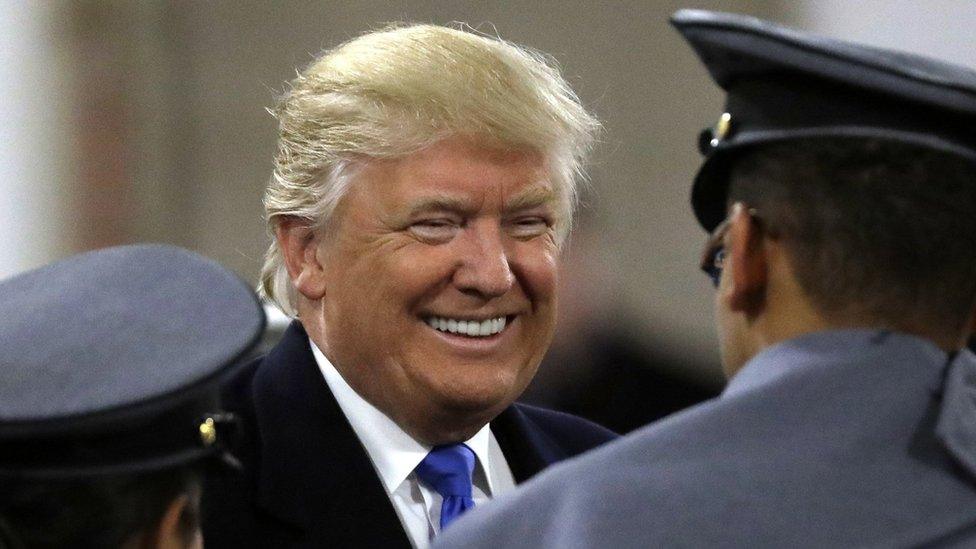Trump condemns CIA Russia hacking report
- Published

Donald Trump has poured fresh scorn on US intelligence claims of Russian hackers meddling in the US election.
He tweeted: "Can you imagine if the election results were the opposite and WE tried to play the Russia/CIA card. It would be called conspiracy theory!"
The US president-elect also questioned why the allegations were not widely made public before the election.
His remarks set the incoming commander-in-chief against intelligence services that he will preside over.
"Unless you catch "hackers" in the act, it is very hard to determine who was doing the hacking. Why wasn't this brought up before election?" Mr Trump tweeted on Monday morning.
The FBI said in October that it believed Russia was behind the Democratic Party hacks but on Friday the CIA went further by concluding Russia's motive was to help Mr Trump.
On Monday, the Hillary Clinton campaign, which lost to Mr Trump in last month's election, said it was supporting an effort by a handful of members of the electoral college to request an intelligence briefing on the latest hacking allegations.
Mrs Clinton's top political adviser, John Podesta, told Politico: "The bipartisan electors' letter [requesting the intelligence] raises very grave issues involving our national security."
The electoral college meets next week to ratify the results of the election.

Russian wooden dolls displayed in a Moscow shop
Mr Trump's latest Twitter tirade comes a day after he told Fox News the Democrats were disseminating the "ridiculous" hacking reports because they lost the election, and it was "impossible to know" who was behind it.
On Friday, CIA officials told US media they had "high confidence" that Russian hackers had attempted to sway the US election in Mr Trump's favour.
The Trump team responded to those reports in a statement: "These are the same people that said Saddam Hussein had weapons of mass destruction."

Why the Trump pushback? Anthony Zurcher, BBC News, Washington
Despite Donald Trump's boasts to the contrary, he's entering the White House with a very tenuous claims to a presidential mandate. He trails Democrat Hillary Clinton in the popular vote by 2.8 million votes, and while he posted a comfortable Electoral College win, by historical standards it ranks towards the bottom of victory margins, external (46th out of 58 presidential contests).
This likely explains why the Trump team has been pushing back so vociferously against the allegations that Russians hackers meddled in US politics in an attempt to tilt the election to the Republican. Like the Green Party-backed recounts in three key swing states, it could be viewed as undermining the legitimacy of Mr Trump's victory.
Never mind that the recounts were extremely unlikely to appreciably change the election's results or that Russian hacking is well down the list of factors that contributed to Mrs Clinton's defeat. Mr Trump's angry tweets, and the indignation expressed by his supporters, is evidence enough that the president-elect feels threatened - and is responding with sweeping denunciations of his critics.
In the case of the Russian story, however, concern over foreign meddling is bipartisan, so Mr Trump's recent diatribes may come at a high political price.

On Sunday, John Bolton, the former US envoy to the UN who is tipped to be named deputy secretary of state in the Trump administration, implied on Fox News that the Obama administration could have been behind the hacking.
Mr Bolton, who was one of the Bush administration's most vocal advocates for the Iraq War, told the network: "It is not at all clear to me, just viewing this from the outside, that this hacking into the DNC and the RNC computers was not a false flag operation."
False flag is a term commonly used by so-called conspiracy theorists, often to describe covert attacks by a government to advance its own agenda by making it appear as though someone else was responsible.
"If you think the Russians did this, why did they leave fingerprints?" Mr Bolton added.
President Barack Obama has ordered a complete review of the hacks, which targeted emails at the Democratic Party and the emails of a key aide to presidential nominee Hillary Clinton.
The contents of the emails, passed to Wikileaks and posted online, were embarrassing to the Democrats and shook up the presidential campaign.
Senior Republicans have joined Democrats in calling for a full investigation.
Senate Majority Leader Mitch McConnell said it "defies belief" that some Republicans are reluctant to review the alleged Russian tactics.
Republican Senator John McCain, chairman of the Senate Armed Services Committee, said in a joint statement on Sunday with top Democrats that the CIA's report "should alarm every American".

How to catch a hacker
While a company that is breached by hackers can really only work from the digital evidence left behind, nation states or intelligence agencies have many more sources to draw on when gathering evidence, said Rick Holland, vice president of strategy at cyber-security firm Digital Shadows.
"They have a full spectrum of capabilities such as signal intelligence and human intelligence," he said, adding: "It's definitely not all cyber-based."
That extra evidence meant intelligence agencies could be more confident with their conclusions than many others, he said.
"It's certainly not simple," said Mr Holland. "But I do not think attribution is impossible when it comes to nation-states at all."
Mr Holland admitted that some nation states did sometimes run so-called "false flag" operations that attempted to pin the blame for an attack on someone else.
It could be difficult to unpick who was behind an attack because both spies and cyber-criminals used each others' attack tools and methods in a bid to throw investigators off the scent.
"There is a lot down that rabbit hole when it comes to nation states," he said.
While nation states did try to hide their attacks, there were times when knowing who was behind an attack was a useful diplomatic tool.
"Some nation states are very obvious and want you to know who was behind it," he said. "They will put you on notice that they did this."